
 |
|
|
|
|
|
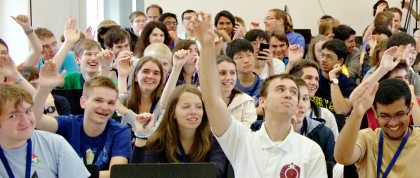 |
|
|
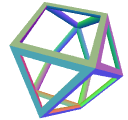 |
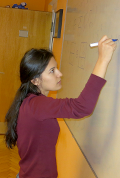 |
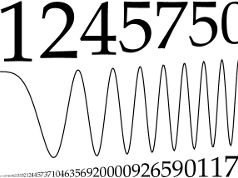 |
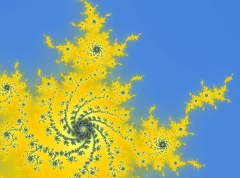 |
|
|
|
Course contentsGeneral Mathematics and Computational Science I and II are the introductory first year courses for students in Mathematics and Applied and Computational Mathematics. In addition, these courses address anyone with an interest in mathematics and mathematical modeling. Each semester includes a selection of ``pure'' and ``applied'' topics which provide a solid foundation for further study, convey the pleasure of doing mathematics, and relate mathematical concepts to real-world applications.Topics covered in the first semester are:
| ||||||||||||||||||||||||||||||||||||||||||||||||||||||||||||||||||||||||||||||||||||||||||||||||||||||||||||||||||||||||||||||||||||||||||||||||||||||||||||||||||||||||||||||||||||||||||||||||||||||||||||||||||||||||||||||||||||||||||||||||||||||||||||||||||||||||||||||||||||||||||||||||||||||||||||||||||||||||||||||||||||||||||||||||||||||||||||||||||||||||||||||||||||||||||||||||||||||||||||||||||||||||||||||||||||||||||||||||||||||||||||||||||||||||||||||||||||||||||||||||||||||||||||||||||||||||||||||||||||||||||||||||||||||||||||||||||||||||||||||||||||||||||||||||||||||||||||||||||||||||||||||||||||||||||||||||||||||||||||||||||||||||||||||||||||||||||||||||||||||||||||||||||||||||||||||||||||||||||||||||||||||||||||||||||||||||||||||||||||||||||||||||||||||||||||||||||||||||||||||||||||||||||||||||||||||||||||||||||||||||||||
| Short Name: | GenMathCPS II | |
| Type: | Lecture | |
| Credit Points: | 5 | |
| Prerequisites: | 110101 | |
| Corequisites: | None | |
| Tutorial: | Yes |
| Short Name: | NatSciLab SymbSoft | |
| Type: | Lab | |
| Credit Points: | 2.5 | |
| Prerequisites: | None | |
| Corequisites: | None | |
| Tutorial: | No |
The Lab Unit Symbolic Software introduces Mathematica, a software package that can perform complex symbolic manipulations such as solving algebraic equations, finding integrals in closed form, or factoring mathematical expressions. Mathematica also has powerful and flexible graphing capabilities that are useful for illustrating concepts as well as numerical data. The computer will be used as a tool in this course so that you will also learn some mathematics alongside learning to use the computer program.
| Short Name: | NatSciLab NumSoft | |
| Type: | Lab | |
| Credit Points: | 2.5 | |
| Prerequisites: | None | |
| Corequisites: | None | |
| Tutorial: | No |
The Lab Unit Numerical Software introduces Matlab and its free cousin Octave, software packages that allow easy and in many cases efficient implementations of matrix-based ``number crunching''. The software is ideal for numerical work such as solving differential equations or analyzing large amounts of laboratory data. The computer will be used as a tool in this course so that you will also learn some mathematics alongside learning to use the computer program.
This Lab Unit is particularly suited for students from both schools interested in experiments, as Matlab is used as a standard tool for analyzing and visualizing data in many fields of research.
| Short Name: | ESM 1A | |
| Type: | Lecture | |
| Credit Points: | 5 | |
| Prerequisites: | None | |
| Corequisites: | None | |
| Tutorial: | Yes |
The course ESM 1A covers basic differential and integral calculus of functions of one variable. It starts with a brief review of number systems and elementary functions, then introduces limits (for both sequences and functions) and continuity, and finally derivatives and differentiation with applications (tangent problem, error propagation, minima/maxima, zero-finding, curve sketching). A short chapter introduces complex numbers.
The second half of the semester is devoted to integration (anti-derivatives and Riemann integral) with applications, and concluded by brief introductions to scalar separable and linear first-order differential equations, and the convergence of sequences and power series.
Compared to ESM 1C which covers similar material, this course assumes a rigorous high school preparation in Mathematics and leaves more room for explaining mathematical concepts (as needed for the majority of SES majors).
| Short Name: | ESM 1B | |
| Type: | Lecture | |
| Credit Points: | 5 | |
| Prerequisites: | None | |
| Corequisites: | 120101 | |
| Tutorial: | Yes |
The course covers vector algebra (three-dimensional vectors, dot product, cross product), equations of lines, planes, and spheres, Euclidean distance, vector-valued functions, space curves, functions of several variables, partial derivatives, chain rule, gradient, directional derivative, extrema, Lagrange multipliers, double and triple integrals with applications, change of variables, vector fields, divergence, curl, cylindrical and spherical coordinates, line integrals, Green's theorem in the plane, surface and volume integrals, divergence theorem, Stokes' theorem, introduction to ordinary differential equations (direction field, the question of existence and uniqueness of solutions), separable and exact equations, integrating factors, and linear higher order ODEs with constant coefficients.
| Short Name: | ESM 2A | |
| Type: | Lecture | |
| Credit Points: | 5 | |
| Prerequisites: | None | |
| Corequisites: | None | |
| Tutorial: | Yes |
ESM 2A is recommended for students majoring in Life Sciences or Chemistry. It covers the following topics: Linear Algebra (equations of lines and planes, matrix algebra, system of linear equations, matrix inverse, vector spaces, linear independence, basis, dimension, linear transformations, change of basis, eigenvalues and eigenvectors, diagonalization). Probability (basic notions of set theory, outcomes, events, sample space, probability, conditional probability, Bayes' rule, permutations and combinations, random variables, expected value, variance, binomial, Poisson, and normal distributions, central limit theorem). Statistics (one-sample hypothesis testing, two sample hypothesis testing, chi-square hypothesis testing, analysis of variance, bivariate association, simple linear regression, multiple regression and correlation).
| Short Name: | ESM 2B | |
| Type: | Lecture | |
| Credit Points: | 5 | |
| Prerequisites: | 120101 or 120111 or 120121 | |
| Corequisites: | None | |
| Tutorial: | Yes |
ESM 2B is recommended for students who do not intend to major in the Life Sciences or Chemistry. It covers the following topics:
| Short Name: | ESM 4A | |
| Type: | Lecture | |
| Credit Points: | 5 | |
| Prerequisites: | 120112 or 100221 | |
| Corequisites: | None | |
| Tutorial: | No |
This course is a hands-on introduction to numerical methods. It covers root finding methods, solving systems of linear equations, interpolation, numerical quadrature, solving ordinary differential equations, the fast Fourier transform, and optimization. These methods are crucial for anyone who wishes to apply mathematics to the real world, i.e. computer scientists, electrical engineers, physicists and, of course, mathematicians themselves.
| Short Name: | Analysis I | |
| Type: | Lecture | |
| Credit Points: | 7.5 | |
| Prerequisites: | None | |
| Corequisites: | None | |
| Tutorial: | Yes |
The Analysis sequence begins with a quick review of natural, rational and real numbers (which are assumed as known), and introduces the field of complex numbers. The axiom of completeness distinguishes the real numbers from the rationals and marks the beginning of Analysis. The complex exponential and trigonometric functions are defined.
Metric spaces are introduced and used to define continuity and convergence in a general framework. The Bolzano-Weierstraß and the Heine-Borel theorems are proved. The intermediate and maximal value theorems for functions on the real line are discussed as consequences of connectedness and compactness on metric spaces. Sequences of functions are discussed, in particular uniform convergence, as well as the continuity, differentiability, integrability of the limit function.
Differentiability of functions on the real line is introduced. The mean value theorem and Taylor's theorem is discussed.
The Riemann integral in one variable is introduced. The relation between the derivative and the integral, i.e., the fundamental theorem of calculus is proved.
This course has no formal prerequisites; incoming students with a strong mathematics background are encouraged to take this class in their first semester. However, a familiarity with mathematical reasoning and proof (e.g. proof by induction or by contradiction), such as introduced in General Mathematics and Computational Science I, is required.
| Short Name: | Analysis II | |
| Type: | Lecture | |
| Credit Points: | 7.5 | |
| Prerequisites: | 100211 | |
| Corequisites: | 100221 or 120102 or 120112 (if not already taken) | |
| Tutorial: | Yes |
| Short Name: | LinAlg I | |
| Type: | Lecture | |
| Credit Points: | 7.5 | |
| Prerequisites: | None | |
| Corequisites: | None | |
| Tutorial: | Yes |
The course begins by introducing the concept of a vector space over an arbitrary field (for example, the real or complex numbers) and the concept of linear independence, leading to the notion of ``dimension''. We proceed to define linear maps between vector spaces and discuss properties such as nullity and rank. Linear maps can be represented by matrices and we show how matrices can be used to compute ranks and kernels of linear maps or to solve linear systems of equations.
In order to study some geometric problems and talk about lengths and angles, we introduce an additional structure called the inner or scalar product on real vector spaces. Properties of Euclidean vector spaces and orthogonal maps are treated, including the Cauchy-Schwarz inequality, Gram-Schmidt orthonormalization and orthogonal and unitary groups.
An endomorphism is a linear map from a vector space to itself and is represented by a square matrix. We study the trace and determinant of endomorphisms and matrices and discuss eigenvalues and eigenvectors. We discuss the question whether a matrix is diagonalizable and state the theorem on Jordan Normal Form which provides a classification of endomorphisms.
This course has no formal prerequisites; incoming students with a strong mathematics background are encouraged to take this class in their first semester. However, a familiarity with mathematical reasoning and proof (e.g. proof by induction or by contradiction), such as introduced in General Mathematics and Computational Science I, is required.
| Short Name: | LinAlg II | |
| Type: | Lecture | |
| Credit Points: | 7.5 | |
| Prerequisites: | 100221 | |
| Corequisites: | None | |
| Tutorial: | Yes |
In the first part, we continue the discussion of endomorphisms, discussing the Cayley-Hamilton Theorem and minimal polynomials, and giving some versions of Jordan normal form over non-algebraically closed fields.
The second part of the course deals with dual spaces and quadratic, symmetric and skew-symmetric forms. We introduce the dual vector space and dual linear maps and their relation with bilinear forms. Classifications are given of symmetric and skew-symmetric real bilinear forms and of Hermitian and skew-Hermitian forms over the complex numbers.
The last part is concerned with tensors -- objects that play an important role in many branches of physics and mathematics. The tensor product of two (or more) vector spaces is introduced and properties are discussed including the universal property, contraction of tensors, `outer' and `inner' products, and the relationship between linear maps and tensors.
| Short Name: | Perspectives I | |
| Type: | Lecture | |
| Credit Points: | 5 | |
| Prerequisites: | None | |
| Corequisites: | 100211 or 100221 | |
| Tutorial: | No |
Topics vary; past instances of this course have included combinatorial game theory, hyperbolic and spherical geometries, manifolds, Fourier analysis and wavelets, the Banach-Tarski-paradox, dynamical systems and chaos, and others.
For students in Mathematics and ACM, this course is designed to be taken at the same time as Analysis I and/or Analysis I. It is open to anyone with interest and some experience in mathematics (for others, General Mathematics and Computational Science I is recommended). Instead of a final exam, students write a term paper on a mathematical subject of their choice and present it to the class.
| Short Name: | Perspectives II | |
| Type: | Lecture | |
| Credit Points: | 5 | |
| Prerequisites: | 100211 or 100221 | |
| Corequisites: | None | |
| Tutorial: | No |
| Short Name: | NumAnal | |
| Type: | Lecture | |
| Credit Points: | 7.5 | |
| Prerequisites: | 100212 | |
| Corequisites: | None | |
| Tutorial: | Yes |
| Short Name: | MathMod BioMed | |
| Type: | Lecture | |
| Credit Points: | 7.5 | |
| Prerequisites: | 100212 | |
| Corequisites: | None | |
| Tutorial: | Yes |
| Short Name: | ComplexAnal | |
| Type: | Lecture | |
| Credit Points: | 7.5 | |
| Prerequisites: | 100212 and 100221 | |
| Corequisites: | None | |
| Tutorial: | Yes |
Topics include holomorphic functions, Cauchy integral theorem and formula, Liouville's theorem, fundamental theorem of algebra, isolated singularities and Laurent series, analytic continuation and monodromy theorem, residue theorem, normal families and Montel's theorem, and the Riemann mapping theorem.
Possible further topics are elliptic and modular functions, the Riemann zeta function, introduction to Riemann surfaces.
| Short Name: | RealAna | |
| Type: | Lecture | |
| Credit Points: | 7.5 | |
| Prerequisites: | 100212 | |
| Corequisites: | None | |
| Tutorial: | Yes |
The course is suitable for undergraduate students who have taken Analysis I/II, and Linear Algebra I; it should also be taken by incoming students of the Graduate Program in the Mathematical Sciences. Due to the central role of integration in the applied sciences, this course provides an excellent foundation for mathematically advanced students from physics and engineering.
| Short Name: | IntroAlgebra | |
| Type: | Lecture | |
| Credit Points: | 7.5 | |
| Prerequisites: | 100221 | |
| Corequisites: | None | |
| Tutorial: | Yes |
Group Theory: Definitions and key examples. Cosets and Lagrange's theorem. Group homomorphisms and basic constructions including quotient groups, direct and semi-direct products. Some examples of (important) groups. Group actions and orbit-stabilizer theorem. Possibly: Sylow theorems.
(Commutative) Rings: Definitions and elementary properties. Ideals, ring homomorphisms and quotient rings. Domains, Euclidean domains, principal ideal domains and unique factorization. Polynomial rings.
Field extensions: Roots of polynomials. Irreducibiliy criteria. Finite and algebraic field extensions. Finite fields. Possibly: Splitting fields and algebraic closure. Constructions with straightedge and compass.
If time permits Modules: Definitions and basic constructions. Linear maps and exact sequences. Direct products and sums. Structure theory for finitely generated modules over a principal ideal domain.
| Short Name: | IntroNumTheory | |
| Type: | Lecture | |
| Credit Points: | 7.5 | |
| Prerequisites: | 100211 and 100321 | |
| Corequisites: | None | |
| Tutorial: | Yes |
The course will then move on beyond elementary number theory. Depending on the interests of students and instructor, possible topics are Pell's equation and continued fractions, the Prime Number Theorem, Dirichlet's theorem about primes in arithmetic progressions, or elliptic curves.
| Short Name: | DiscMath | |
| Type: | Lecture | |
| Credit Points: | 7.5 | |
| Prerequisites: | None | |
| Corequisites: | None | |
| Tutorial: | Yes |
Discrete mathematics is a branch of mathematics that deals with discrete objects and has naturally many applications to computer science. This course introduces the basics of the subject, in particular (enumerative) combinatorics, graph theory, as well as mathematical logic.
Enumerative combinatorics includes the binomial and multinomial coefficients, the pigeonhole principle, the inclusion-exclusion formula, generating functions, partitions, and Young diagrams.
Fundamental topics in graph theory include trees (spanning trees, enumeration of trees), cycles (Eulerian and Hamiltonian cycles), planar graphs (Kuratowski's theorem), colorings, and matching (perfect matchings, Hall's theorem).
In mathematical logic, among the basic topics are the Zermelo-Fraenkel axioms, as well as cardinal and ordinal numbers and their properties.
Additional topics may be chosen depending on interests of instructor and students.
| Short Name: | IntroTopology | |
| Type: | Lecture | |
| Credit Points: | 7.5 | |
| Prerequisites: | 100211 and 100221 | |
| Corequisites: | None | |
| Tutorial: | Yes |
The second part of the course deals with basic concepts of algebraic topology. We introduce the notion of homotopy, construct the fundamental group of a space and introduce the Seifert-van Kampen theorem, a key tool for computing fundamental groups. We discuss covering spaces and their relation with the fundamental group, including the construction of the universal covering space.
The course concludes with a basic treatment of homology groups and their properties, which are a fundamental tool for distinguishing topological spaces and mappings between them.
| Short Name: | ManifoldsTop | |
| Type: | Lecture | |
| Credit Points: | 7.5 | |
| Prerequisites: | 100212 and 100221 | |
| Corequisites: | None | |
| Tutorial: | Yes |
The course starts with introducing the notion of a manifold, followed by examples that naturally arise in various areas of mathematics. Differentiability, tangent spaces and vector fields are then defined. This will be followed by establishing the notion of integration on manifolds. We will then formulate and prove Stokes' theorem, which is the higher-dimensional generalization of the fundamental theorem of calculus. Among the further topics that are discussed in the course are: orientation, degree of a map, Lie groups and their actions. The classification of one- and two-dimensional manifolds and the Poincaré-Hopf theorem will be some of the highlights of the course.
| Short Name: | DynSystems | |
| Type: | Lecture | |
| Credit Points: | 7.5 | |
| Prerequisites: | 100212 and 100221 | |
| Corequisites: | None | |
| Tutorial: | Yes |
| Short Name: | Intro PDE | |
| Type: | Lecture | |
| Credit Points: | 7.5 | |
| Prerequisites: | 100212 | |
| Corequisites: | None | |
| Tutorial: | Yes |
This course alternates with Partial Differential Equations which takes a functional analytic approach to partial differential equations.
| Short Name: | StochProc | |
| Type: | Lecture | |
| Credit Points: | 7.5 | |
| Prerequisites: | 100212 | |
| Corequisites: | None | |
| Tutorial: | Yes |
The main part of the course is devoted to studying important classes of discrete and continuous time stochastic processes. In the discrete time case, topics include sequences of independent random variables, large deviation theory, Markov chains (in particular random walks on graphs), branching processes, and optimal stopping times. In the continuous time case, Poisson processes, Wiener processes (Brownian motion) and some related processes will be discussed.
This course alternates with Applied Stochastic Processes.
| Short Name: | ApplStochProc | |
| Type: | Lecture | |
| Credit Points: | 7.5 | |
| Prerequisites: | 100212 | |
| Corequisites: | None | |
| Tutorial: | Yes |
The applied part of this course revolves around the central question of option pricing in markets without arbitrage which will be first posed and fully solved in the case of binomial model. Interestingly enough, many of the fundamental concepts of financial mathematics such as arbitrage, martingale measure, replication and hedging will manifest themselves, even in this simple model. After discussing conditional expectation and martingales, more sophisticated models will be introduced that involve multiple assets and several trading dates. After discussing the fundamental theorem of asset pricing in the discrete case, the course will turn to continuous processes. The Wiener process, Ito integrals, basic stochastic calculus, combined with the main applied counterpart, the Black-Scholes model, will conclude the course.
This course alternates with Stochastic Processes.
| Short Name: | GR Math I | |
| Type: | Self Study | |
| Credit Points: | 7.5 | |
| Prerequisites: | permission of instructor | |
| Corequisites: | None | |
| Tutorial: | No |
Guided research has three major components: Literature study, research project, and seminar presentation. The relative weight of each will vary according to topic area, the level of preparedness of the participant(s), and the number of students in the study group. Possible research tasks include formulating and proving a conjecture, proving a known theorem in a novel way, investigating a mathematical problem by computer experiments, or studying a problem of practical importance using mathematical methods.
Third year students in Mathematics and ACM are advised to take 1-2 semesters of Guided Research. The Guided Research report in the spring semester will typically be the Bachelor's Thesis which is a graduation requirement for every Jacobs University undergraduate. Note that the Bachelor's Thesis may also be written as part of any other course by arrangement with the respective instructor of record.
Students are responsible for finding a member of the faculty as a supervisor and report the name of the supervisor and the project title to the instructor of record no later than the end of Week 4. A semester plan is due by the end of Week 6.
| Short Name: | GR Math II | |
| Type: | Self Study | |
| Credit Points: | 7.5 | |
| Prerequisites: | permission of instructor | |
| Corequisites: | None | |
| Tutorial: | No |
| Short Name: | ApplAnalysis | |
| Type: | Lecture | |
| Credit Points: | 7.5 | |
| Prerequisites: | None | |
| Corequisites: | None | |
| Tutorial: | No |
| Short Name: | CompAnalysis | |
| Type: | Lecture | |
| Credit Points: | 7.5 | |
| Prerequisites: | None | |
| Corequisites: | None | |
| Tutorial: | No |
Due to the varying content, this course can be taken multiple times for credit.
| Short Name: | Algebra | |
| Type: | Lecture | |
| Credit Points: | 7.5 | |
| Prerequisites: | None | |
| Corequisites: | None | |
| Tutorial: | No |
| Short Name: | AdvAlg | |
| Type: | Lecture | |
| Credit Points: | 7.5 | |
| Prerequisites: | None | |
| Corequisites: | None | |
| Tutorial: | No |
| Short Name: | AlgGeometry | |
| Type: | Lecture | |
| Credit Points: | 7.5 | |
| Prerequisites: | None | |
| Corequisites: | None | |
| Tutorial: | No |
Basic concepts from Algebra and Introductory Algebra are used in this course. Among the studied subjects are affine and projetive varieties, schemes, curves, and cohomology.
| Short Name: | AlgebrTopology | |
| Type: | Lecture | |
| Credit Points: | 7.5 | |
| Prerequisites: | None | |
| Corequisites: | None | |
| Tutorial: | No |
The first part studies the definition of homology and the properties that lead to the axiomatic characterization of homology theory. Then further algebraic concepts such as cohomology and the multiplicative structure in cohomology are introduced. In the last section the duality between homology and cohomology of manifolds is studied and few basic elements of obstruction theory are discussed.
The graduate algebraic topology course gives a solid introduction to fundamental ideas and results that are used nowadays in most areas of pure mathematics and theoretical physics.
| Short Name: | DiffGeom | |
| Type: | Lecture | |
| Credit Points: | 7.5 | |
| Prerequisites: | None | |
| Corequisites: | None | |
| Tutorial: | No |
| Short Name: | LieGroups | |
| Type: | Lecture | |
| Credit Points: | 7.5 | |
| Prerequisites: | None | |
| Corequisites: | None | |
| Tutorial: | No |
The course presents fundamental concepts, methods and results of Lie theory and representation theory. It covers the relation between Lie groups and Lie algebras, structure theory of Lie algebras, classification of semisimple Lie algebras, finite-dimensional representations of Lie algebras, and tensor representations and their irreducible decompositions.
A solid background in multivariable real analysis and linear algebra is presumed. Familiarity with some basic algebra and group theory will also be helpful. No prior knowledge of differential geometry is necessary.
| Short Name: | ModernGeometry | |
| Type: | Lecture | |
| Credit Points: | 7.5 | |
| Prerequisites: | None | |
| Corequisites: | None | |
| Tutorial: | No |
The following concepts, known from the 300-level courses, should be briefly reviewed: concept of a manifold, the simplest examples of manifolds, and the concept of homotopy.
The core of the course will consist of explaining material related to the following topics: Lie groups, homogeneous spaces, symmetric spaces, fiber bundles, vector bundles, Morse theory, differential topology of mappings and submanifolds.
This material will provide a solid background for the 400-level courses, Differential Geometry and Algebraic Topology.
| Short Name: | DynSystems | |
| Type: | Lecture | |
| Credit Points: | 7.5 | |
| Prerequisites: | None | |
| Corequisites: | None | |
| Tutorial: | No |
One theme in the course is the study of the underlying questions and difficulties in terms of model equations that are much simpler, often 1-, 2-, or at most 3-dimensional, but yet show rich and interesting dynamical features. A fundamental tool is to describe the dynamics of flows in terms of iterated maps of lower dimension, which are of great interest in their own right. Among the topics covered are circle homeomorphisms and endomorphisms, including rotation numbers, the quadratic family, toral automorphisms, horseshoes and the solenoid, the Lorenz systems, symbolic dynamics and shifts, and Sharkovski's theorem.
A second topic are ways to describe and quantify how complicated dynamical systems are: recurrence, topological transitivity and periodic orbits, mixing dynamics, topological and metric entropy, Lyapunov exponents, ergodicity and Birkhoff's theorem, and more.
Finally, there will be a discussion of general hyperbolic dynamics, including the stable/unstable manifold theorem and the shadowing lemma (not necessarily with detailed proofs in full generality).
| Short Name: | FunctAnalysis | |
| Type: | Lecture | |
| Credit Points: | 7.5 | |
| Prerequisites: | None | |
| Corequisites: | None | |
| Tutorial: | No |
Even though abstract in nature, the tools of Functional Analysis play a central role in applied mathematics, e.g., in partial differential equations. To illustrate this strength of Functional Analysis is one of the goals of this course.
| Short Name: | PDE | |
| Type: | Lecture | |
| Credit Points: | 7.5 | |
| Prerequisites: | 100313 | |
| Corequisites: | None | |
| Tutorial: | No |
This course differs from the approach taken in Introductory Partial Differential Equations which focuses on solutions in classical function spaces via Greens functions. It may therefore be taken by students who have attended Introductory Partial Differential Equations, but we will again start from basic principles so that Introductory Partial Differential Equations is not a prerequisite.
Last updated
2019-10-10, 12:01.
© Jacobs University Bremen.
All rights reserved.
Data Privacy Statement/Datenschutzerklärung